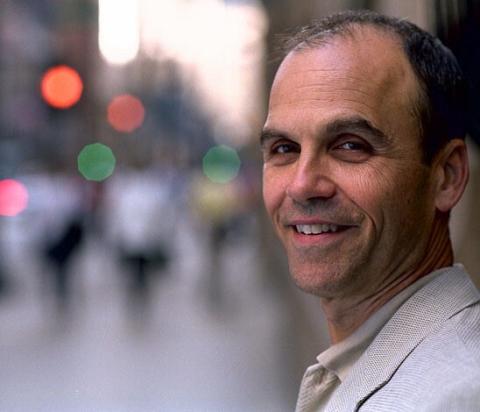Scott Turow '70, P'09

Scott Turow
Current Home
Lives in a suburb of Chicago
Place of Birth
Chicago, Illinois
Why did you choose to come to Amherst?
After attending high school with nearly 5,000 students, I wanted to go to a small college. Amherst seemed to be the best!!
Most memorable or most influential class at Amherst?
Time with Tillie Olsen, Leo Marx, Dave Sofield, both in class and during my senior year as an independent scholar, stand out among many wonderful intellectual experiences at Amherst
Awards and Prizes
British Crime Writers Silver Dagger Award for Presumed Innocent (1988); Time Magazine, Best Work of Fiction 1999 for Personal Injuries; Heartland Prize for Reversible Errors (Year); Robert F. Kennedy Award for Ultimate Punishment (Year)
Favorite Book
Anna Karenina by Tolstoy
Favorite Author
Graham Greene, Charles Dickens, Saul Bellow. A cast of thousands!
Tips for aspiring writers?
Write, no kidding!! Writers write.
Tell us a bit about your path to becoming an author.
Amherst to the Stanford Creative Writing Center as a Fellow and teacher, 1970-75, then the great break of my literary career, going to law school, which led to One L. But I never abandoned hope of publishing a novel, which kept me working on the book that became Presumed Innocent, while I served as an Assistant US Attorney
Scott Turow is a writer and attorney. He is the author of eleven best-selling novels, including Presumed Innocent (1987) and The Burden of Proof (1990). Innocent, a sequel to Presumed Innocent, was published by Grand Central Publishing in May, 2010. His newest novel, Testimony, was published by Grand Central Publishing in May, 2017. He has also written two non-fiction books—One L (1977) about his experience as a law student, and Ultimate Punishment (2003), a reflection on the death penalty. He has frequently contributed essays and op-ed pieces to publications such as The New York Times, Washington Post, Vanity Fair, The New Yorker, Playboy and The Atlantic. Mr. Turow’s books have won a number of literary awards, including the Heartland Prize in 2003 for Reversible Errors, the Robert F. Kennedy Book Award in 2004 for Ultimate Punishment, and the Carl Sandburg Award in 2016. His books have been translated into more than 25 languages and have sold more than 30 million copies world-wide.
Mr. Turow’s novels have been translated into a number of films, including the movie, Presumed Innocent (1990), as well as two TV mini-series (Burden of Proof, 1992 and Reversible Errors, 2004) and a TV movie, Innocent (2011). More recently, he has written three pilot scripts for TV.
Mr. Turow continues to work as an attorney. He has been a partner in the Chicago office of Dentons (formerly Sonnenschein, Nath & Rosenthal), an international law firm, since 1986, concentrating on white collar criminal defense, while also devoting a substantial part of his time to pro bono matters. In one such case, he represented Alejandro Hernandez in the successful appeal that preceded Hernandez’s release after nearly twelve years in prison – including five on death row – for a murder he did not commit.
Scott Turow was born on April 12, 1949 in Chicago, Illinois. He graduated with high honors from Amherst College in 1970. That year, he received an Edith Mirrielees Fellowship to the Stanford University Creative Writing Center, which he attended from 1970-72. From 1972 to 1975, Mr. Turow taught Creative Writing at Stanford, as E.H. Jones Lecturer. In 1975, he entered Harvard Law School, graduating with honors in 1978. From 1978 to 1986, he was an Assistant United States Attorney in Chicago. He was one of the prosecutors in the trial of Illinois Attorney General William J. Scott, who was convicted of tax fraud. Mr. Turow was also lead government counsel in a number of the trials connected to Operation Greylord, a federal investigation of corruption in the Illinois judiciary. Mr. Turow has been active in a number of charitable causes. From 2010-2014, he served as President of the Authors Guild, which is the national membership organization for professional writers, and served as President once again. He is an Emeritus Trustee of Amherst College.
Mr. Turow has been appointed to a number of public bodies. He was the first Chair of Illinois' Executive Ethics Commission which was created in 2004 to regulate executive branch employees in the Illinois State government. From 2002-2004, he served as Chair of the Illinois State Appellate Defender’s Commission, which oversees the state agency which represents indigent criminal defendants in their appeals. He served as one of the fourteen members of the Commission appointed in March, 2000, by Illinois Governor George Ryan to consider reform of the capital punishment system; the Commission was appointed after Governor Ryan declared a Moratorium on executions and delivered its report in April 2002. From 2000 to 2002, Mr. Turow was a member of the Illinois State Police Merit Board, which determines matters of hiring, promotion and discipline for members of the Illinois State Police. He also has served in 1997 and 1998 on the United States Senate Nominations Commission for the Northern District of Illinois, which recommended appointment of federal judges.
Mr. Turow lives outside Chicago.
Photo by David Joel